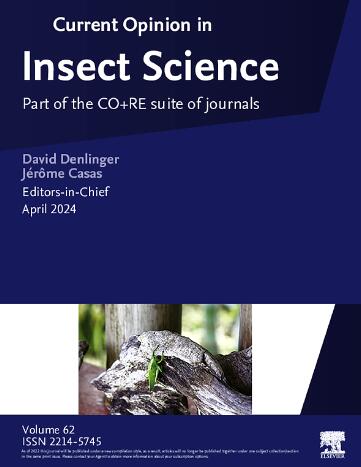蜜蜂认知中的生物胺:神经化学途径和应激影响
IF 4.8
1区 农林科学
Q1 BIOLOGY
引用次数: 0
摘要
蜜蜂作为不可缺少的传粉者,依靠复杂的神经调节网络来调节学习、记忆和社会行为,这些对群体功能、生态系统稳定和全球农业系统都至关重要。生物胺:章鱼胺、多巴胺、血清素和酪胺是这些认知和行为过程的关键调节剂,调节觅食效率、导航精度和劳动分工。然而,我们认为人为压力源,包括农药、污染物、重金属和微生物群落失调,通过损害神经递质合成和神经元信号传导来破坏胺能通路,导致适应不良行为和群体崩溃。最近的发现扩展了这一范式,揭示了花蜜中的生物胺作为外源性神经化学物质,可能改变传粉者的行为;然而,它们与农用化学品的相互作用仍未得到充分研究。虽然大多数研究集中在蜜蜂,但我们警告说,考虑到昆虫类群中胺能信号的进化保护,对野生和独居蜜蜂的谨慎外推是至关重要的。在管理蜜蜂中观察到的认知缺陷可能扩展到野生传粉媒介,威胁传粉网络的弹性和粮食安全。为了解决这些空白,我们提倡基于crispr的神经遗传学工具和多组学方法来解剖应激易感性和生物胺(BA)调节。整合神经生物学、生态毒理学和保护科学是制定精确策略以减轻人为威胁、保护生物多样性和稳定全球农业的必要条件。本文章由计算机程序翻译,如有差异,请以英文原文为准。
Biogenic amines in honey bee cognition: neurochemical pathways and stress impacts
Honey bees, as indispensable pollinators, rely on sophisticated neuromodulatory networks to regulate learning, memory, and social behaviors, all essential for colony function, ecosystem stability, and global agricultural systems. Biogenic amines octopamine, dopamine, serotonin, and tyramine are key modulators of these cognitive and behavioral processes, regulating foraging efficiency, navigational precision, and division of labor. However, we argue that anthropogenic stressors, including pesticides, pollutants, heavy metals, and microbiome dysbiosis, disrupt aminergic pathways by impairing neurotransmitter synthesis and neuronal signaling, leading to maladaptive behaviors and colony collapse. Recent discoveries expand this paradigm, revealing those biogenic amines in floral nectar act as exogenous neurochemicals, potentially altering pollinator behavior; however, their interaction with agrochemicals remains underexplored. While most studies focus on Apis mellifera, we caution that cautious extrapolation to wild and solitary bees is critical, given the evolutionary conservation of aminergic signaling across insect taxa. Cognitive deficits observed in managed honeybees likely extend to wild pollinators, threatening pollination network resilience and food security. To address these gaps, we advocate for CRISPR-based neurogenetic tools and multi-omics approaches to dissect stress susceptibility and biogenic amine (BA) regulation. Integrating neurobiology, ecotoxicology, and conservation science is imperative to develop precision strategies that mitigate anthropogenic threats, safeguard biodiversity, and stabilize global agriculture.
求助全文
通过发布文献求助,成功后即可免费获取论文全文。
去求助
来源期刊

Current opinion in insect science
BIOLOGYECOLOGYENTOMOLOGY-ECOLOGY
CiteScore
10.40
自引率
1.90%
发文量
113
期刊介绍:
Current Opinion in Insect Science is a new systematic review journal that aims to provide specialists with a unique and educational platform to keep up–to–date with the expanding volume of information published in the field of Insect Science. As this is such a broad discipline, we have determined themed sections each of which is reviewed once a year.
The following 11 areas are covered by Current Opinion in Insect Science.
-Ecology
-Insect genomics
-Global Change Biology
-Molecular Physiology (Including Immunity)
-Pests and Resistance
-Parasites, Parasitoids and Biological Control
-Behavioural Ecology
-Development and Regulation
-Social Insects
-Neuroscience
-Vectors and Medical and Veterinary Entomology
There is also a section that changes every year to reflect hot topics in the field.
Section Editors, who are major authorities in their area, are appointed by the Editors of the journal. They divide their section into a number of topics, ensuring that the field is comprehensively covered and that all issues of current importance are emphasized. Section Editors commission articles from leading scientists on each topic that they have selected and the commissioned authors write short review articles in which they present recent developments in their subject, emphasizing the aspects that, in their opinion, are most important. In addition, they provide short annotations to the papers that they consider to be most interesting from all those published in their topic over the previous year.
 求助内容:
求助内容: 应助结果提醒方式:
应助结果提醒方式:


